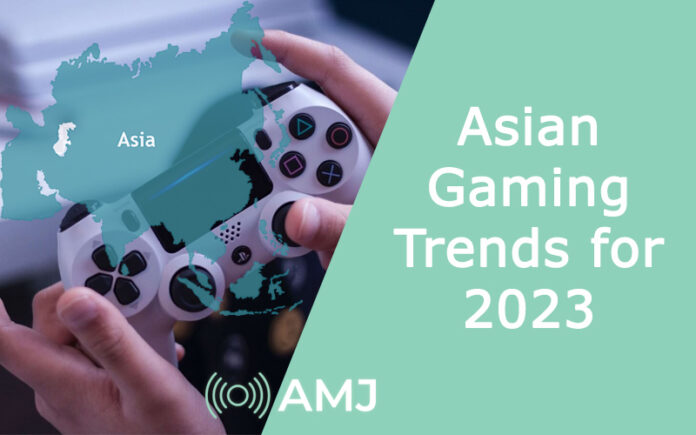
When it comes to gaming, Asian markets have long boasted a global reputation. Japan, for instance, is a well-established market for console gaming, having been at the centre of many gaming innovations in this sector for decades. More recently, South Korea has developed an international reputation for being the Asian centre of eSports and online gaming. As we move further into the decade, China and Southeast Asia will be looking to expand their foothold in the global gaming industry.
Here are some of the key trends that we predict will emerge in Asian gaming markets throughout 2023 and beyond.
Contents
A Rapidly-Evolving Landscape
The video gaming industry has undergone tremendous evolution since its inception several decades ago. In the early days of gaming, video games were played on arcade machines before shifting to dedicated consoles. Over time, the market expanded to include more sophisticated PCs and portable devices, like Nintendo’s Game Boy.
It was the introduction of the internet at the turn of the century, however, that had the most dramatic impact on the gaming industry. A number of gaming genres sprung into life thanks to the power of connected tech, and brand-new gaming markets were created, from online multiplayer games to digital casinos.
By the 2010s, online gaming platforms and marketplaces had become the most innovative and accessible ways to play games. The likes of PokerStars Casino, which delivers immersive and popular titles in slots gaming like Sweet Bonanza, were soaring in popularity, as were digital distribution platforms, such as GOG.com and Valve’s Steam.
In recent years, the shift to mobile gaming on smartphones and tablets has led to an explosion in the number of casual gamers and created several new revenue streams for the industry. Additionally, advancements in technology have brought about more realistic graphics, more immersive experiences, and virtual and augmented reality gaming.
The gaming industry is a rapidly evolving landscape, making it perfectly primed for dominance by the Asian and Tiger economies.
Japan will Revolutionise Mobile
Japan has already established itself as a gaming superpower thanks to major console manufacturers like Sony and Nintendo. However, in 2023, we can expect the Japanese gaming market to switch focus to the mobile gaming space.
For instance, the development company behind the iconic Final Fantasy franchise recently opened a new mobile gaming studio headquartered in London, England. The studio focuses primarily on releasing free-to-play titles that include in-app purchases, and it’s a business model that’s proved to be successful. Between 2019 and 2022, Square Enix’s revenue from smart device and browser games increased from 41% to 46%, becoming the primary source of revenue during those three years.
Of course, Japanese game developers are also exploring various new technologies beyond mobile and cloud gaming, such as AI and the metaverse. In 2022, Square Enix teamed up with the experienced NFT game developer Gumi to launch metaverse gaming experiences. Meanwhile, incumbents like Sony are ramping up production on their VR efforts, unleashing the new VR2 headset sometime in February 2023.
China to Focus on Quality Game Production
The Chinese gaming market has been marred by strict regulations in recent years. However, the tide is beginning to turn with the 2022 thawing of investor sentiments towards gaming development in the country. All signs now point towards China shifting its focus towards quality game production, prioritising quality over quantity, which will be a vital factor in generating international prestige.
For example, the success of Genshin Impact gives a good indication of the potential success that awaits Chinese game makers. The gacha-based RPG was developed by miHoYo and became a global mobile hit in 2020 before transitioning to the console (PlayStation 4). Having amassed over $986 million in revenue during 2022, Genshin Impact finished the year as the third highest-grossing game in the world.
Southeast Asia Becomes an eSports Hub
Southeast Asia is quickly becoming a dominant force in eSports and could soon rival South Korea’s throne as the Asian eSports Hub. Attitudes towards eSports in countries like Malaysia and the Philippines are becoming increasingly normalised; the region even displayed the second-fastest revenue growth for the sector in 2022 at 17.2% (following India at 18.3%).
Furthermore, several notable eSports events have also taken place in the southeastern region. In 2019, the Phillippines included eSports events alongside traditional sporting events for the first time at the Southeast Asian Games, held in Manila. Looking forward, summer 2023 will see Singapore host the inaugural Olympic Esports Week, which is set to be an IOC-sponsored event.













![Index of Money Heist [Season 1, 2, 3 & 4 – All Episodes, Cast and Plot] Index of Money Heist](https://www.asiamediajournal.com/wp-content/uploads/2021/05/Index-of-Money-Heist-3-100x70.jpg)